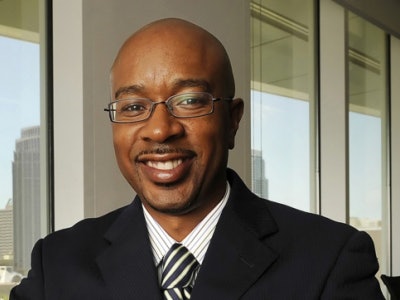A new partnership between a prominent scholar of urban education and a respected academic press is being hailed as a “game changer” that will yield new publishing opportunities for academicians—particularly those at historically Black colleges and universities and other minority serving institutions—who have traditionally struggled to get their research published and widely disseminated.
The Academic Publishing Program in Urban Education & Black Studies is a collaborative effort between Information Age Publishing and Dr. Chance W. Lewis, the Carol Grotnes Belk Distinguished Professor of Urban Education at the University of North Carolina at Charlotte.
The partnership was created to forge relationships with academic departments and schools at colleges and universities across the country that have a desire to help their faculty produce academic books in the growing field of urban education and Black studies.
“There’s an expectation for faculty and others to do books, but most of them do it only out of obligation because it’s a curriculum vitae item, or it checks a box when they’re looking for promotion and tenure,” said Lewis, who is also director of the Urban Education Collaborative at UNC Charlotte.
 Dr. Chance W. Lewis
Dr. Chance W. LewisThe goal, he said, “of getting true impact is limited, and what usually happens is that the onus is on the individual faculty member to find a publisher, to submit a proposal and work out a relationship to get their work disseminated.”
That process can be particularly daunting for faculty members, particularly those at HBCUs and other MSIs who have heavy teaching loads and serve on a ton of committees. For many, writing an academic book often falls by the wayside.
Lewis, one of the nation’s most respected education scholars, knows. He’s received dozens of phone calls from newly minted and seasoned faculty across the years, soliciting advice on how to write a book proposal, how to shop it around to publishers and how to market their work once their book is published.
The Academic Publishing Program shepherds faculty through the entire process, providing ongoing mentoring, support and marketing once the book is published by Information Age.
“We get a commitment from a senior-level administrator like a dean who will say, ‘Yes, we want in on this partnership program. We will make sure that our faculty and graduate students approach this with their work and look at it from a standpoint of bringing forward those people who are producing high-quality materials, as well,’” said Lewis.
So far, two HBCUs have committed to participating in the program and Lewis is looking to onboard other institutions, as well.
“We’re able to say, ‘Look, we have a partnership with this academic publisher, now you as an individual do not have to send a proposal to eight different publishers,’” said Lewis, who is the author or co-editor of more than 20 books. “We have an entry for you to get your work disseminated if it’s high-quality and it changes the game by moving the relationship from the individual to the entity, as well.”
Lewis said that the program’s focus on urban education and Black studies is intentional.
“There is a very limited amount of material in academic books around these particular titles,” he said. “You have a lot of things out there but they’re not necessarily academic books that scholars need to progress through the ranks.”
Colleges and universities that participate in the program are encouraged to pre-purchase copies of a newly acquired text to disseminate to other faculty and to use in classes once the book is published.
Lewis said that the program will “change the narrative” and shift the perception that scholars at HBCUs and MSIs are not interested in writing academic books.
“You have scholars all across institution types,” said Lewis. “My goal is to expand the reach of this faculty and to propel their careers.”
Dr. Janelle L. Williams, a visiting scholar at Rutgers University’s Graduate School of Education, said that she welcomes this initiative that seeks to move the needle, especially for researchers of color.
“As an emerging scholar, this partnership is ideal in that it provides a platform to publish and opportunities to add to the content of Black studies,” said Williams. “ In addition, this partnership allows scholars like myself the chance to be mentored through the process, which can be intimidating.”
Jamal Watson can be reached at [email protected]. You can follow him on Twitter @jamalericwatson




















